"I'd love to work with the people who really got the film industry going again through the '70s - Peter Weir, Bruce Beresford, Gillian Armstrong, Fred Schepisi".
***
"Manchewski certainly reflects where he comes from. I don't think he'd be embarassed by me saying that he does have a balcan temperament. He's extremely creative individual. Sometimes he is quite difficult to work with but I think that happens to be absolutely fine because all the time he has the greatest intentions for the film. Everything he fights for, it's for the film. He's a director that has the highest faith in actor's abilities and so once he cast you he really give the actor a lot of power. Manchewski is a very specific idiosyncratic voice in the film community".
***
"Peter Weir. I think he's an incredible director, not just because he's Australian, because he's done so many moves but every one of those movies is unique and different and not like any others. He does something unusual, uses music on set. While you're doing a scene he has music that may be in the film, or just some mood music".
***
"I can say, unreservedly, that Peter Jackson is at the top of the tree. There's Peter Jackson and then everybody else. Undoubtedly. And history will show that".
***
"I learn from every job, you pick up the things that inspire you, or you can be-come aware of somebody's bad habits. The obvious one is Peter Jackson; you can't help but admire this man's immense talents and incredible achievements. To be on set of Lord of the Rings and to see him in front of his tremendous bank of moni-tors, directing main unit but also knowing what was happening on sets and loca-tions all across the country being beamed in by satellite was truly inspiring. Baz Luhrmann was another one; his infectious energy and amazing imagination and creativity are pretty awesome".
***
"There is only one Baz Luhrmann, there's no one you can compare him too, he's unique".
♦
about his roles and projects:
• "The Boys", Brett Sprague:
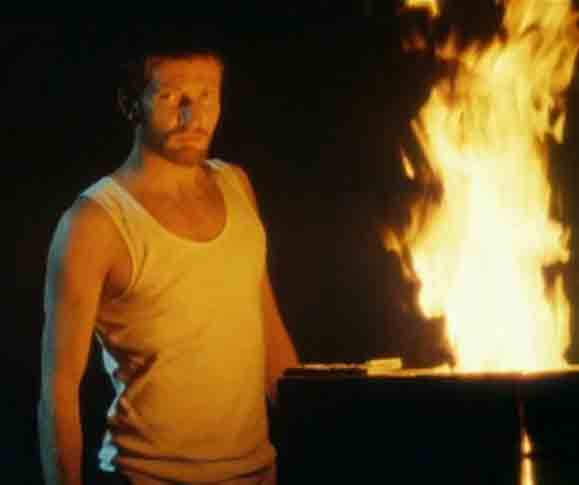
"I'd done a lot of theatre before that, and this one affected a lot of people. Every night, we'd come down and there'd be people wanting to talk about the piece, which is unusual. Not many people wanted to approach me".
***
"It's the one film that I look at and I can say I actually can't improve on that".
***
"It was never going to be a simplistic cause and effect film. Hopefully that will be the success of the film - the fact that you can't say, 'Ah yes, it's because of that.' The film is so complex. It's a combination of social, economic and psychological factors. How big a factor does Brett's impotence play in the situation, or that these boys grew up with one parent? There are so many different factors".
***
"The really great thing is that it offered no solutions, and it made the audience talk about it. If Hollywood made this film, you would see the event".
***
"The Boys was never about THE CRIME, but the events leading up to it".
***
"With Brett it was a conscious decision not to present evil personified. I wanted to make this character as flawed and real as possible. Brett constructs a backyard phi-losophy of a world which he lives his life by and to me that's a lot more believ-able".
***
"At fist I could not see his face, but I could hear him, I could hear the rhythms of his character, I could hear the speech patterns, and then I could visualise the way he moved. I started to get him. And then his look came. The way he looked. And I knew, I had him".
***
"I try not to. I try, whether it be filming or doing theatre, to, as I hang the costume up in the dressing room, to leave the character there. Sometimes, and particularly with this particular character, it's stuck to you for periods of time. It's not something that I'd be conscious of, but it would be something that people who'd be with me in social situations would be conscious of, whether it be an overuse of language, slightly violent, aggressive behaviour that was not relevant in the circumstances... There was one particular instance where I couldn't help but be aware of it. Toni Colette asked to - well, she didn't ask, she just left the set. She couldn't bear to look at me anymore".
***
"I had to be one step removed - if I thought about what I was doing too much, I would have pulled out".
• "SeaChange", Diver Dan:
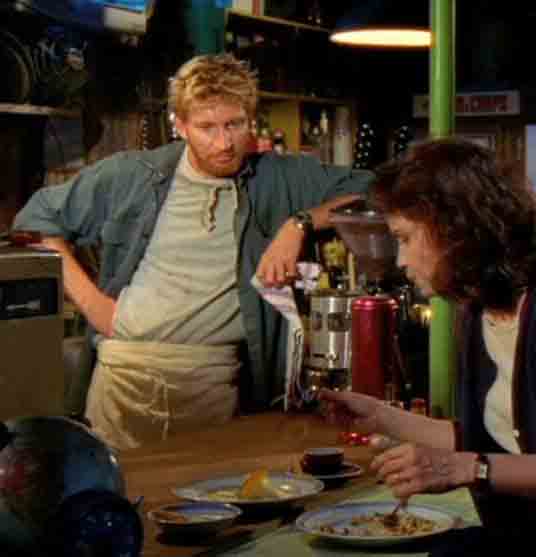
"I love the character so it's hard for me to be objective. It was quite a long journey for me, too, to eventually locate him. I began by looking as far away from myself as possible and it didn't work. There was no resonance. So it came back closer to myself."
***
"I think a lot of women were attracted to a men who had culinary skills. The hardest thing about playing him was looking proficient with a knife and not losing a finger'.
***
"It's been a slight surprise to me over the past few years that I've actually moved to playing characters that are "straighter". That actually wasn't by design, it was just by pure chance really. And how that occurred, I did a television series in Aus-tralia which became very popular and opened up doors that I would never have thought existed. Which has been a wonderful, pleasant surprise to me, because I suppose it's meant that I throw a little bit of confusion into casting which is good. Because I try not to fit into any particular box which I actually quite like".
***
"I kind of missed the whole Diver Dan phenomenon, if that's what you could call it.I was working overseas when my episodes of SeaChange screened, so I wasn't really aware of how it was being perceived by the public. It was really weird to come back home and have people yell out "G'day Dan!" in the street".
***
"On the national network, Sunday night, no one watched then, but suddenly the show was number 1 in Australia. I had "out" option in my contract, I wanted to quit when he was ahead, also planned to do another movie. I do love that television program".
***
"It was until SeaChange that my mum finally stopped reminding me I should never have left the NRMA".
• "Molokai: The Story of Father Damien", Father Damien:
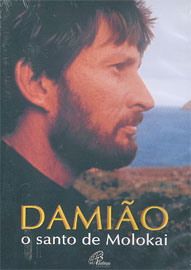
"Playing this role is very dear to me and has affected me on a personal level. Leprosy has a stigma about it, but being around these wonderful people was an uplifting experience. They are the most joyous people, there's not a hint of bitterness about them".
***
"I think it's the film Paul wanted to make. It's a very honest portrayal. That was the greatest joy of working on the film for me. My favourite scenes were those with the patients. They're very honest and it made my job so much easier. I remember a couple of scenes, like the one in the dying shed'some of the patients would really believe that it was Father Damian walking into the room, and that sense of reality helped me a great deal"
***
"Technically it is an extremely difficult role: You have an Australian actor coming to Hawaii to play a Belgian priest who delivers a Latin Mass, who sings, who rides a horse. Also in terms of the expectation that is on me, especially in this country and especially in Belgium. People have perceptions about the man. I try not to think about it too much. I am here. I'm going to do my best".
***
"Filming there you can sense the history. It's so beautiful but you get off the little plane at the settlement and the first thing you're confronted with is masses of graves".
***
"Some of the sets were an hour away from where Paul and I were staying in the settlement. More often than not the person who was supposed to take me to the set would either forget or not turn up. After shooting 14-hour days, I'd walk back in the dark along dirt tracks. But that was a small thing in the multitude of things we had to overcome".
***
``A film about a man who gives up everything to help people who are far less
fortunate than himself, somebody who's quite altruistic, [and] the film got
caught up because of money and arguments about money. The producers were very strange individuals, to the say the least... And after having hired Paul and knowing what sort of filmmaker Paul is - a very honest, truthful filmmaker -- they wanted something totally different...
A film about a priest who helps people who have contracted leprosy and they
came out with comments like `The film has too many lepers', gives you an
indication of where their heads were'
The whole process was frustrating: making it, having to deal with
incompetent producers on a daily basis for four months in Hawaii...
Paul and myself were working under pressure the whole time. In a strange way
it sort of helped my character but I never want to go through that situation
again''.
***
"Living at Kalaupapa for the four or so months doing 'Molokai: The Story of Fa-ther Damien' really is one of the most profound experiences of my professional and personal life. I leaped into the Kalaupapa community with a passion. The best part was getting to talk story with the leprosy patients and make friends. I will always treasure that and feel privileged".
***
"I turn 33 just before the film finishes, which is the same age Father Damien was when he came here. The most important research for me was talking to the patients for their firsthand experiences ... what they had actually been through, to gain some insight into the pain and hardship they have experienced. I don't see them as people who are terribly different, and I think that is how Father Damien saw them. I just see them as friends -- they are very human people who just happen to suffer from a specific disease. My first hope for the film would be that the patients here approve and that it is something they respect. My second hope is that, if it educates people and if people get something from this film, that would be rewarding. What goes on the inside of that man was extremely special and doesn't occur in very many people. He is so big and so widely remembered throughout the whole world for his attributes, his incredible love for his fellow humans".
***
"That was probably the best thing in the world I've ever done".
***
"I defy anybody to go to that place and not be affected or moved or changed. These are people who have suffered through the most incredibly disturbing lives and yet are so full of joy and full of life. You realize how ridiculous some of the petty things that upset us in our rather privileged lives are. It was a huge life lesson. Those people had a profound effect on me".
***
"Finally I have done a movie both my parents can watch. My parents are my role models and I'm just thrilled that they loved the film."
• "The Bank", Jim Doyle:

"I hate banks. I was looking forward to that little line".
***
"There's a lot of public support for that film. Probably daily, people stop me in the street to talk about that particular film. I think at least every second person has a bank story".
• "Better Than Sex", Josh:

"The thing that initially fascinated me about doing "better than sex" were the little things that occurred between two people who don't know each other very well that really want to. The little idiosyncrasies that you're aware of with somebody you don't know very well. Those funny little moments you can't predict".
***
"The perfect image has got a little bit out of hand. I think that's what's so fantastic about this particular film. [Co-star] Susie [Porter] and I ... well ... it's not Brad Pitt and Julia Roberts up there; it's two people everyone can relate to, hopefully. I think that's attractive''.
***
"So yeah, Josh is a character that I suppose is closer to me, and yeah, it was more of a challenge. Because, you know, you're naked up there. Literally!"
***
"It was refreshing, like nothing that I'd ever read before and certainly different for an Australian screenplay. It had the element of surprise and for me that's the key to any good film, play or piece of television".
***
"Why I like the film is that fact that it's about little moments in relationships, especially those first few days meeting somebody new, and you're not used to the person's body, to their mannerisms, their behavior so it's a time of discovery'.
***
"It's a fine balance because everyone does have opinions about one-night stands and it's a film that doesn't moralise or judge. It just leaves it up to the audience. I think most people can relate to certain situations that occur in that film. My instinct is that it's very accessible''.
• "Dust", Luke:

"It's every boy's fantasy, in a way. But there was a bizarre duality about that. Yes, it is fun playing a cowboy - jumping on a horse and rolling around and firing off your pistol. At the same time, this film is extremely violent, and when people get shot it is very bloody; that can be disturbing when you're in the middle of it. So it's fun, but deadly".
***
"Milcho is a stickler for facts. One night - I mean, in the middle of the night - he sent me a fax. Suddenly spewing out of my machine was a suggested bibliography which ran to 130 books, on America and the Balkans. "Ambitious," I thought. But it did open up worlds that weren't totally familiar to me. There were some fabulous articles about missionaries in Macedonia at that time. I remember one by a lady called Miss Rock, about her adventures with bandits..."
• "Moulin Rouge", Audrey:

"It was great. I feel very fortunate to be involved in that project. Baz asked me about it like a couple of years before it went into production. Told me about it and that he'd love for me to be involved in some capacity and he spoke to me about a couple of roles and said, whichever you fancy. I sort of fancied that bizarre little character. A bit of fun".
***
" ... I prefer characters that are far removed from myself and the idea of a writer who thinks he's an absolute genius and everyone else thinks he's a fool and hap-pens to be extremely camp and effeminate and looks a little bit like Louise Brooks, it sort of appealed to me. And that fact that no one, not even my closest friends, know who I am in the film puts a smile on my face".
• "The Lord of the Ring", Faramir:
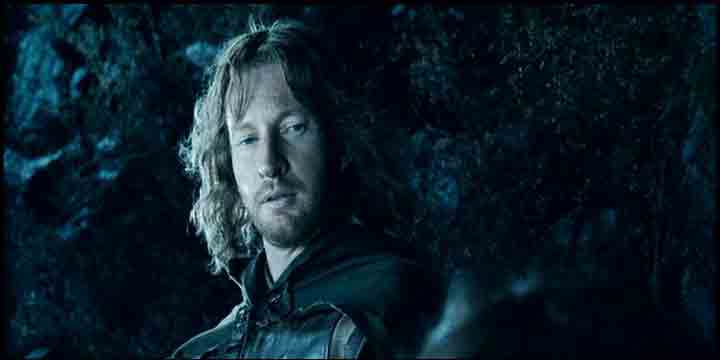 how did he get this project?
how did he get this project?
"I met Peter Jackson and his wife Fran [Walsh] who is one of the writers on Lord of the Rings about three years ago. Myself and Robert Connolly were over in New Zealand on a bit of a promotional tour and I think we were the second people after the New Zealand Prime Minister to go through what is the Weta Studios in Wel-lington".
***
"We met Peter and Fran then and got taken on a little tour through the studio on this magnificent movie they were about to embark on in the future, having no idea that however long down the track, I'd be involved in".
***
"Here's a little secret. I was cast in 'The Lord of the Rings' because I resembled my on-screen brother, Sean Bean. We both have big noses".
what was the most difficult thing?
"I was the second-last actor to arrive on set, they'd been filming for about 10 years before [audience laughs]. They were all so close, which helped my character, being an outsider".
***
"I don't think I would've turned up on set if I had thought about the responsibility that we carried with the fact that so many people around the world know these characters as well if not better than I do. I've read the book a couple of times now, I'm involved in the movie, but when it comes to the intricacies of Middle-Earth I'm the first to admit that there's people far more knowledgeable about it than I am. In terms of responsibility in playing a character that people sort of know, its slightly daunting because there is a difference between the book and the film - especially with the character of Faramir. Peter and the writers made a decision to give the character more jeopardy than he has in the book to increase the dramatic tension. If you shot what was in the book, the character doesn't change - he's inherently not dramatic and you couldn't put that up on screen. So hopefully the people who are obsessed with the Tolkien novel will understand that, and go along with it. I think they will, all those people have trusted Peter so far and I don't think that's going to change".
***
"My scenes are difficult. I come to work every day and get yelled at by my fa-ther".
***
"Riding was a challenge, for quite some time I didn't get on with my horse. I've ridden in other times, but I couldn't get on with the horse, it turned out to have a slight injury, so we changed horses".
***
"I loved my costumes - especially the Ranger outfit. It was pretty use-friendly. The armor suit, though, wasn't comfortable at all when I had to ride into battle. Much of that suit was actually made up of a thick plastic substance. But don't tell that to the guys at Weta. Tell them I said, 'It was brilliant and fit me like a glove' ".
***
"The sword is razor sharp and it was on Elijah's neck, I said, 'I don't really need to be doing this, they can't tell who's hand it is, get someone else to do it'.
***
"My very last scene with everything was a fight sequence with the retreat of Os-giliath. I was exhausted 'cause you know what Pete's like with the fight scenes... "Let's go again!" By the end of it, I ended up with blisters on my feet and hands. Peter was like, "OK, that's it for Faramir!" and we had the wrap party and every-thing. Then, I got the phone call. It was the only time, I think, in the whole filming process where footage was slightly disturbed in the processing department...
And I had to go back and do the whole sequence again. After I'd wrapped! Came back and it was "Ladies and gentlemen... we're back!"
***
"I've had a little look [at LOTR websites and chatrooms], and I must say, I find that quite scary. You have to separate yourself in a way, otherwise it does become rather frightening."
what was the most pleasant and unforgettable thing?
"The people involved, really. Not necessary the costumes or the sets or anything, but the people. The people make projects like this".
***
"Ecstatic just to be involved in it. An amazing project directed by a truly incredible director".
***
"It was a very different experience to anything else. I hadn't read the book before I was given the baton to come on board. Then I had an opportunity to read the book, and that was like putting many layers of icing on the cake. And it was an enormous cake".
***
"I think for all of us involved, as soon as we arrived in New Zealand, we knew this was a one-off project. Certainly, being involved in the film adaptation of Tolkien`s LOTR was special enough. The book, I think, is the second biggest selling book after the Bible. And then to go into Peter Jackson's studios in Wellington and see the amount of work and passion and sweat that had been put into the project before any of the actors arrived, was truly overwhelming. The attention to detail involved in the production, I don't know if it'll ever be surpassed".
***
"The design, for me, is overwhelming. The scale of it, the detail within it. It is mind boggling the amount of sweat, pain and love that's gone into the sets, the cos-tumes, the weaponry, the armor. It's a humbling experience, seeing the amount of work people have put into this. They made sure there was a truth in everything on screen. Near enough wasn't good enough. I consider myself bloody lucky to have been involved in this project".
***
"My very first scene I shot in New Zealand for Lord of the Rings was the two of us standing, after the Houses of Healing, the two of us together, towards the end of the film. It happens so often, you end up shooting the end of the film at the start. Miranda was relatively new then too, we didn't have much rehearsal, just jumped in the deep end. I really enjoyed the parts in the Houses of Healing".
***
"I remember pinching myself one day, being on a horse amongst hundreds of horses and stunt men, and thinking, I'm a pretty lucky guy".
what role he would like to have played?
"Gollum would have been fun, but I don't think I'd have been anywhere near as good as Andy Serkis. Andy's work in the film is incredible. That voice will haunt me forever".
what he received in memory of LOTR?
"I have a heap of stuff that Peter doesn't know about, I'd make a fortune off ebay! Seriously, each of the key cast members, when they finished their last day, Peter and the producers presented each with a present and with the clapper board. I've got my sword".
***
"I'll never forget anything about Middle Earth. That's part of my memory now so I won't miss anything".
what does he think about this after years?
"Unique. I look back and it's like, I'm very lucky to have been involved in that. There are only a couple of dozen people in the world who were cast member in that film, and that's an experience that'll stay with us forever. There are occasions throughout the year where we get to bump into each other, and it's a bond that's very special and it'll always be".
***
"I try not to compare projects. That is something that will always stand alone. I was in the gym here in Los Angeles the other day and a crew member who worked on the film happened to be on the rowing machine next to me. We started to talk about the project, and we both agreed that it's slightly surreal that we were part of that project for so long. It becomes part of your life and yet it doesn't; it's become something bigger than itself, in a sense. It's an incredible piece of cinema that will always be there for the rest of history, and we were part of it. We pinch ourselves".
• "Gettin` Square", Johnny Spitieri:
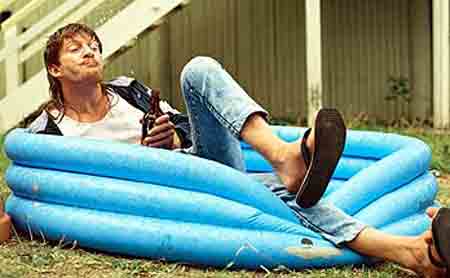
"It's a strange dichotomy because there are people that society wants to shun, but at the same time you can't help but feel compassion towards them and a certain amount of empathy and a great deal of understanding".
***
"I spotted this guy walking along the street: it was Johnny Spitieri! To the life. He was carrying one thing in his hand - it looked so sad and so odd, but at the same time there was humour to it as well. He was walking along, taking his teaspoon for a walk as if he was walking his dog. Obviously the teaspoon was an accoutrement, but it was a bizarre business".
***
"I live in the Kings Cross is Sydney, which is a place for incredibly rich and ec-centric characters, including a lot of junkies. So that was where I got my inspira-tion. It was basically the look and the sound of the character. The first time I read that script, I could actually hear the character's voice, and I was very, very specific in what I wanted to wear for that character. The costume designer had one particular idea, but I had another one and, luckily, she was open to change. But I'd go to second-hand clothing stores and mine, oh, the children's section and also the women's section, strangely enough for clothing for that character".
***
"I came across a guy the other day on Darlinghurst Road who came up to me and said, 'Would you be in my rock opera?' He's this guy who lives pretty much on the streets in Kings Cross, who's written this rock opera. He said me, "You know what? I've spent most of my time up and down this street and people keep saying, 'David Wenham stole you to
Getting` Square!" I'd never come across this guy be-fore".
• "Three Dollars", Eddie Harnovey :

"I found it equally funny and touching. It's as simple as that. It's something I genu-inely responded to. It hit me inside. It's very human portrayal of an ordinary man that I could relate to very well".
***
"I thought it was a terrific story. It also dealt with a character that I could sympa-thise with and understand. He's a character that's the same age as I am. He has a partner and he has a little daughter, as I do at this point in time in my life. He comes to a point in his life where he has $3 to his name. I don't have $3, but that makes him go through his life and try to understand how he actually got to that point in his life, and that's something that, you know, I do every now and again".
• "Stiff", "The Brush-Off", Murray Whelan:
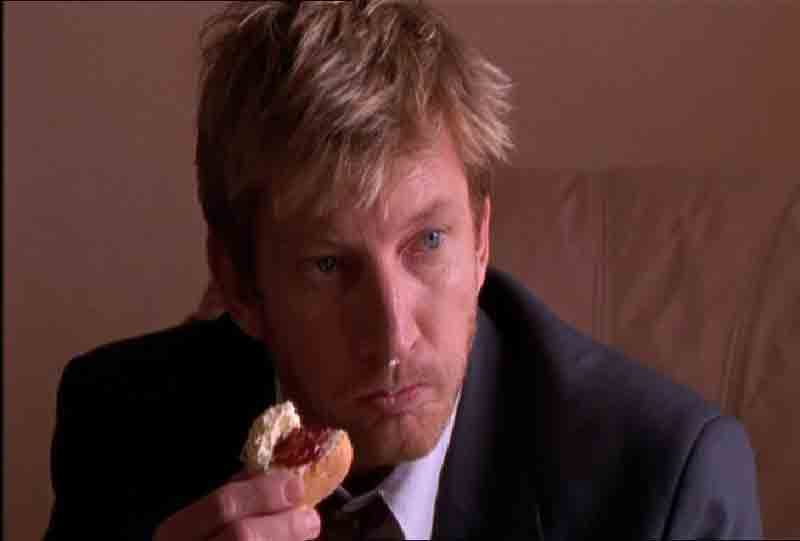
"I do empathise with Murray. He's possibly the closest character to me I have ever played. I came from a background not dissimilar to him".
***
"In many ways (Whelan and I) are similar - disorganized, heart in the right place".
***
"I share an affinity with Murray. I certainly have a similar outlook on the world. I probably have a similar sense of humour and maybe, irony that Murray has. I think he's a fabulously rich character because he's an unlikely protagonist. In each of the movies Murray happens to be put in a situation where he is genuinely a fish out of water, but that doesn't affect him in a way, because he's like - well, we'll power on nevertheless".
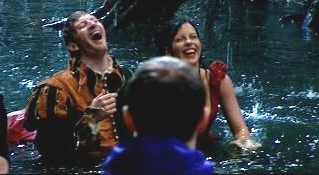 • about his pranks at the time of the shooting of "Van Helsing"
• about his pranks at the time of the shooting of "Van Helsing":
"I can't remember now. That was a while ago. We were shooting outside in minus 17 degrees for three months. It wasn't the easiest of working conditions, so a sense of humour does assist there".
• "The Proposition", Eden Flatcher:
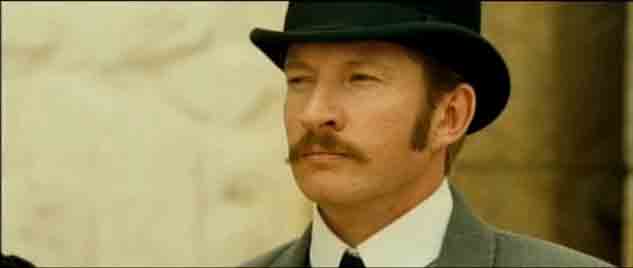
"I can only understand him if I think about the environment back then, in the 1880s in the middle of the Australian desert, with all the harsh environmental elements at play there, and the fact that all these people from England and Ireland and wher-ever happened to have come to this part of the world. They were essentially aliens, and they were fighting against this landscape, so I can understand that there was lawlessness so he had to put in place a system that was black and white purely for survival. From that point of view, I can understand him.
But through today's eyes and today's social conscience and the morality of today, nah, he obviously comes across as a heartless son of a bitch".
• "Answered by Fire", Mark Waldman:

"The project appealed to me because it was history I was very familiar with. I'd be-come interested in the plight of the East Timorese people after I'd seen a documen-tary called Death of a Nation. I joined the Australia East Timor Association, purely to get information about what was happening up there and inform myself as much as possible because it both moved and angered me. It was history . . . and I felt honoured to be a part of telling it".
***
"A very delicate atmosphere. Everybody involved in the production, the rest of the cast, and, as you say, the majority of the cast were East Timorese who had no act-ing experience, but the rest of the cast and all the crew were very much aware of the history of the cast members, who were, essentially, recreating their history. I don't think that there was any of the East Timorese cast who, if they hadn't lost somebody within their family, they certainly knew of people who had and so we were dealing with very sensitive, delicate and raw emotions with the other cast members".
***
"You can't help but come away in that situation with incredible respect and admi-ration for their resilience, their courage, their strength and their great - the wonder-ful human spirit that comes out against horrendous adversity. I also must say as well, and from another point of view, from an acting point of view, I actually learnt quite a bit. Some of the performances, as you know, because I know you've seen it, are truly magnificent and these are from people who have never acted before. I think what I learnt is something that I always try to do as an actor myself, but often forget, and it's something that's so simple but so difficult to achieve. That is to lis-ten to the other actor, but to really listen and to really think about what they're say-ing before you respond. It seems such a simple thing to do, but very few actors ac-tually really do it. Most of the East Timorese cast put into practice that very simple philosophy and, from it, really beautiful and complex performances came out".
***
"They are stunning. All the Indonesian militia are played by East Timorese, and some of the actors had been tortured by the militia members so it was very emo-tional for them. Isabelle, too, is great. There's a wonderful innocence about her character -- a young Canadian police officer thrown into a world that is so alien to her own. The hard thing in terms of pitching this project, and trying to get people to watch it, is the fact that it isn't a dry piece of social or political drama.
It's a ripper story that you can't help but be affected by''.
***
"I never wanted to be the lead. It's their story and they should tell it. The reality is I'm here talking about it because a couple of people in Australia might know my name and that's fine; I understand the reality of that. But their stories are far more fascinating than my life and experiences could ever be''.
• "300", Dilios:
"When I opened it up
(Miller's graphic novel), the very first appearance of my character - a huge Herculean type - was standing over the fire in the nude telling this story. I thought 'you have got to be kidding! That's what I have been cast as? Then I flicked through a few more pages, and saw that the only wardrobe that Dilios and the other Spartans wear was essentially a pair of leather underpants. I thought: What have I just said yes to?"
***
"
(My agent) fell off her chair laughing when I told her my character had to be vir-tually naked throughout, with the body of a Hercules".
***
"Physically it was a huge challenge. I'd never done anything like that in my life before. When we shot the film, which was about 16 months ago, I was the fittest I've ever been in my life".
***
"...But after having spent two months training together, it became so normal. To arrive there in the morning in Montreal, where it could be minus 27 degrees celsius outside, to walk inside that warehouse, take your clothes off, put on a leather codpiece and a cape became so normal because we were so used to it. That's all we knew. So it didn't even enter our minds being anything other than Spartans, and fighting together as a single unit".
***
"The training was a huge part of it, too. You become a Spartan. The thing about the Spartans was the fact that they fought as one unit. Individuality wasn't a Spartan thing. So we all had to physically look similar and move fluidly as one; that was a great big part of it. For me, as well, just the nature of the role - the one change that distinguished Dilios from the other Spartans was the fact that he was a great orator. So the language of the piece was something that was important to me. The lan-guage is very distinctive. It's actually quite a formal language, so it was a matter of trying to get that language sound as natural and realistic as possible".
***
"Audiences, without even realizing, are so cinema-literate and cinema-sawy that they can pick out when something is not completely real. When they see a bunch of guys REALLY fighting it shows. That was one of the joys of working on 300, besides getting extremely fit for it, we actually learned to fight from scratch. We were taught by these great fight-masters. The training included sword and speed training. All of us were extremely proficient at the end of it. We could kill some-one quite easily! (Laughs)"
***
"I have to say I found myself extremely lucky to have experienced that because I was the fittest I have ever been in my life, fitter than when I was in my teens or 20s''.
***
"I wish I could keep it up
(the muscles) but no one can afford that many hours of training unless you are a professional athlete and it's your life. At least we can all look at the film and know we looked like Spartan warriors once in our life!''
***
"I still pinch myself - it was a real Boy's Own adventure. I'd never seen myself in action films, but now I'm waiting for the call".
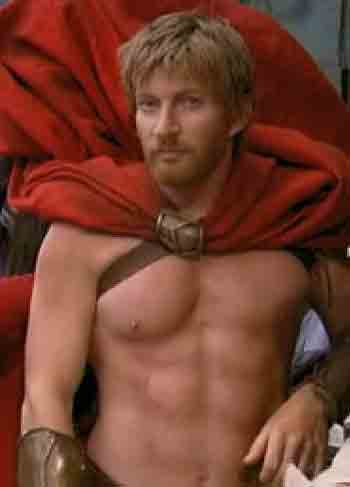
Back / Next